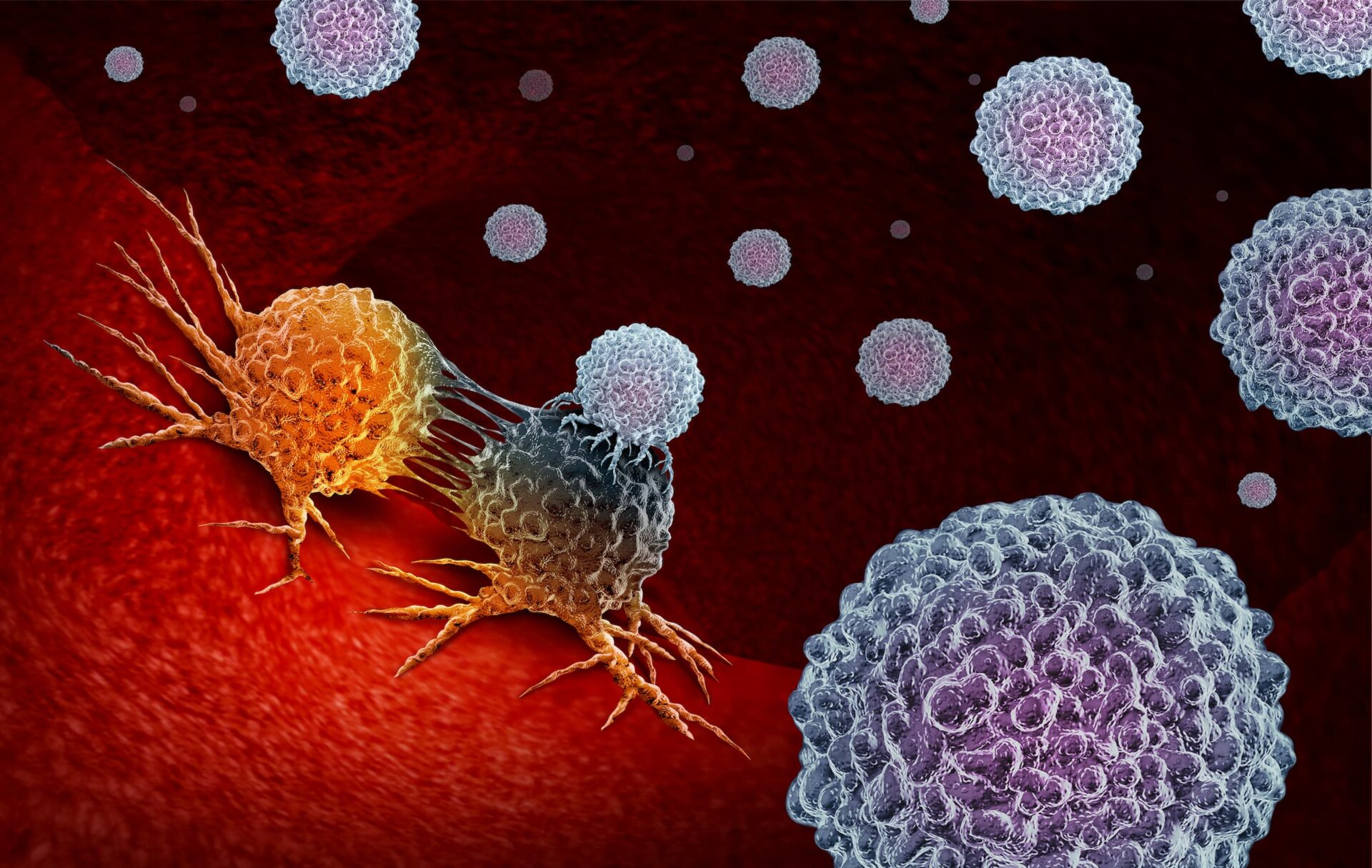What is immunotherapy and what are immune checkpoints?
The basic concept ofimmunotherapy in oncology is based on the idea of unleashing our own immune defenses against the tumor. In this case, we specifically discuss immunotherapy that acts on the PD1-PDL1 mechanism. What is it all about? PD1 and PDL1 are two proteins that play the role of immune checkpointswhich is to say they are checkpoints that ensure that the immune system does not become too active, or stay active too long (think, for example, of autoimmune diseases, in which immune defenses run amok against our own cells). PD1 is found on the surface of cells belonging to our immune system, T lymphocytesLymphocytes are the cells that make up the effective portion of the adaptive immune system; they are able to generate and modify antibodies that will recognize antigens in the future. They are present in primary lymphoid organs, secondary lymphoid organs, peripheral blood and lymph (where they are currently named)., while PDL1 is found expressed on cancer cells. PD1-PDL1 are able to bind to each other and when they do, they block the defensive action of the lymphocyte.
One of the frontier approaches in the field of immunotherapy is precisely to use monoclonal antibodies that block
the interaction between PD1 and PDL1, so that the lymphocyte is no longer subject to this natural inhibitory control mechanism and remains
permanently active in the battle against cancer.
What happens to perpetually activated T lymphocytes?
So far so good, as this approach seems very effective in inducing regression of many types of cancer. Unfortunately, the effectiveness appears to have a time limit, and science is trying to understand why. The answer seems to lie in the mechanism by which our cells neutralize reactive oxygen species, so-called ROS (from reactive oxygen species), often called free radicalsA free radical is a particularly reactive molecule or atom that contains at least one odd electron in its outermost orbital. Because of this chemical characteristic, free radicals are highly unstable and try to return to equilibrium by stealing from the nearby atom the electron needed to equalize its electromagnetic charge. This mechanism gives rise to new unstable molecules, triggering a chain reaction that, if not stopped in time, ends up damaging cellular structures and metabolic processes., which are the product of the normal metabolic activities of the cells themselves. By keeping T lymphocytes in a nonphysiological state of constant activation, the cells are found to accumulate ROS, which thus cause a very harmfulstate of oxidative stress.
In addition, under these conditions T lymphocytes seem to go into a real “energy blockade,” leading to a shortage of ATPAdenosine triphosphate (ATP) can be defined as the "energy currency" of the cell, the instrument through which the cell carries out processes that require energy (endoergonic) and is produced by reactions that release energy (exergonic).. This molecule is fundamental to our bodies because it is the “currency” through which the cell exchanges energy to keep all its vital processes going, but it is also most important for the production of the basic building blocks that make up our DNA, nucleotides. In short, the lymphocytes, continuously stimulated by PD1-PDL1 immunotherapy, are no longer able to synthesize the genetic material necessary for their proliferation and, as a result, stop dividing and slowly go into cell death. Finally, another mechanism that comes into play is that involving glutathione, a molecule that is very important in combating intracellular oxidative stress. In continuously stimulated T lymphocytes, glutathione pools slowly become depleted, feeding the vicious cycle already triggered by ROS accumulation.
N-acetylcysteine helps restore glutathione levels
According to recent studies, conducted first on cells grown in the laboratory and then on mice, adding to immunotherapyN-acetylcysteine (Nac) could prolong its positive effects by directly Defusing the mechanisms of oxidative stress due to “hyperactivation” of T lymphocytes. In other words, this molecule could support the lymphocytes in their “prolonged race” against cancer, which requires them to sustain much more metabolic activity than normal. In particular, N-acetylcysteine is a precursor of glutathione synthesis, so its supplementation would help maintain unaltered intracellular glutathione levels, even under the particularly stressful conditions of continuous activation that T lymphocytes undergo during immunotherapy treatment. N-acetylcysteine has long been the focus of SoLongevity studies and is one of the active ingredients in our nutraceuticals, particularly CellFasting and NeuroProtection, where it acts in synergy with another precursor, polydatin, which in turn generates resveratrolActive ingredient of natural origin with recognized antioxidant capacity (stilbene polyphenol). It is found in plants such as vines and in fruits such as cocoa and blackberries.. The latter is a powerful activator of sirtuinsSirtuins are proteins expressed by SIRT genes that perform an enzymatic activity, which means they stimulate chemical reactions essential for the body. Their function has been ascertained by several studies, although there still seems to be a lot to know about them. SIRTs in short:
• are proteins with enzymatic properties
• regulate the metabolic processes related to insulin resistance
• have a control over immunity
• have a fundamental role in epigenetics
• are involved in defences against cancer
, which in turn are essential for the proper functioning of the immune system. We are talking about research that is still in the preliminary stages and will require clinical trials of efficacy in cancer patients. Our optimism stems from the past three years of experience with this combination of active ingredients that have been found to be safe and very effective in restoring the energy balance of cells.







